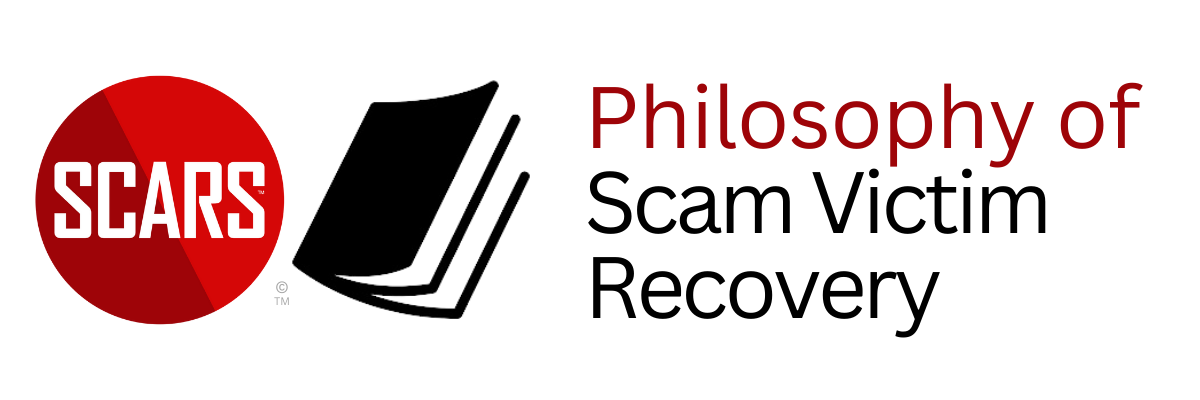The Philosophy of Scam Victim Recovery: Understanding Why Recovery is Important
An Essay about the Deeper Meaning of Scam Victim Recovery
Primary Category: Philosophy of Scam Victim Recovery
Author:
• Tim McGuinness, Ph.D., DFin, MCPO, MAnth – Anthropologist, Scientist, Polymath, Director of the Society of Citizens Against Relationship Scams Inc.
About This Article
The Philosophy of Scam Victim Recovery, as explored by the SCARS Institute, emphasizes that recovery is not just about fixing the financial or emotional damage caused by a scam, but about a deeper journey of reflection, healing, and personal growth. Scam victims experience profound betrayal that shakes their confidence and trust in themselves and others. Through a philosophical lens, recovery involves understanding vulnerability, finding meaning in adversity, and learning self-compassion.
Drawing from ideas like Thomas Nagel’s “Moral Luck,” it becomes clear that many factors contributing to the scam were beyond the victim’s control, helping them release feelings of guilt and self-blame. The process of recovery is about taking responsibility for one’s healing, reflecting on the experience, and rebuilding trust in a more balanced way.
This philosophy teaches that recovery is critical for regaining mental and emotional health, preventing long-term psychological harm, and reclaiming a sense of personal power and resilience. Ultimately, it shows that recovery isn’t just about fixing what was lost but growing stronger from the experience.

The Philosophy of Scam Victim Recovery: Understanding Why Recovery is Important
At SCARS Institute we consider scam victim recovery as a form of philosophy, particularly when approached from a broader perspective of understanding human nature, resilience, and self-compassion. Recovery from a scam involves deep reflection on trust, vulnerability, and how people relate to the world, which aligns with key philosophical themes.
What is Philosophy
Philosophy is the study of fundamental questions about existence, knowledge, values, reason, and ethics. It seeks to understand the nature of reality, human thought, and the principles that guide how we live and interact with the world. Philosophy encourages critical thinking and the exploration of complex ideas, often involving abstract reasoning and deep reflection. It covers a wide range of topics, from understanding the nature of truth and morality to examining how we should live and what it means to be human. At its core, philosophy challenges assumptions, promotes intellectual exploration, and helps individuals form a more thoughtful and coherent worldview.
Scam Victim Recovery as Philosophy
Here are a few ways we view scam victim recovery as a philosophy:
Reflection on Human Vulnerability and Trust
Philosophical reflection often involves exploring human vulnerabilities and how we navigate trust and relationships. Scam victims are forced to confront the reality that trust can be manipulated, and this insight requires deep introspection. The philosophical approach to recovery would involve understanding how much of our relationships and interactions depend on trust, and how we reconcile that with the possibility of deception.
Search for Meaning in Adversity
Philosophy often explores how individuals find meaning in suffering or adversity. Scam victim recovery is about finding purpose and understanding in the trauma of being deceived. Victims may grapple with existential questions, such as “Why did this happen to me?” or “How do I move forward after such a betrayal?” These are fundamentally philosophical inquiries about personal growth, human resilience, and how we define ourselves after trauma.
Moral Responsibility and Self-Compassion
Using philosophical concepts like Thomas Nagel’s “Moral Luck,” victims can examine the balance between accountability and external circumstances in their victimization. This helps foster a sense of self-compassion and acceptance, recognizing that some factors were beyond their control. The philosophical approach encourages reflection on personal responsibility without blame, emphasizing growth, learning, and self-forgiveness.
Ethical Considerations in Recovery
The process of recovery also involves ethical questions, such as how to balance self-care with the desire to prevent others from being scammed. Victims may feel a moral duty to warn others, to expose the scam, or to rebuild their lives ethically after the financial and emotional damage. These decisions are philosophical in nature, as they involve thinking about one’s responsibility to oneself and the broader community.
Mindfulness and Philosophical Practices in Recovery
Recovery often includes mindfulness or cognitive behavioral therapy techniques, which themselves are rooted in ancient philosophical traditions. Practices like stoicism, for example, encourage reflection on what we can and cannot control, similar to what scam victims must do when processing their experience. Philosophical practices guide victims to focus on their internal recovery and personal growth, rather than being fixated on external events or trying to reverse the past.
In this sense, scam victim recovery should become a personal philosophy for every scam survivor—an ongoing practice of reflection, learning, and growth in the face of adversity.
A Path to Healing and Understanding
Scam victim recovery is a philosophy but also much more.
It is a process that goes beyond simply fixing what was lost. It’s about reflecting deeply on human vulnerability, trust, and personal growth after betrayal. Scam victims are often left feeling ashamed, guilty, or broken, but a philosophical approach to recovery offers a broader perspective, helping them heal not only emotionally but also intellectually and morally. This kind of recovery encourages deep reflection on how scams affect our sense of self and how we can rebuild, not just financially, but in a more holistic way.
Trust, Vulnerability, and Betrayal
At the core of scam victim recovery is the need to understand the nature of trust and vulnerability.
Philosopher Søren Kierkegaard once said, “To dare is to lose one’s footing momentarily. Not to dare is to lose oneself.”
Scam victims, in trusting others, dared to connect, often in a deeply personal way. When that trust is broken through deceit, it can feel like a loss of self. Recovering from a scam involves understanding that vulnerability and trust are natural parts of human life, and the act of trusting, though it may lead to betrayal, is not inherently wrong.
Trust is a foundational element of human relationships, but when it is manipulated by scammers, victims often blame themselves. Philosophically, it’s important to recognize that trust should not be abandoned, but understood as a risk that all humans take in relationships. Scam recovery is about regaining trust in oneself and others, but with a new awareness of the balance between trust and caution.
Moral Responsibility and Forgiveness
Many scam victims experience deep feelings of guilt, often believing that they should have known better or could have prevented the scam. However, as philosopher Thomas Nagel explored in his concept of “Moral Luck,” much of what happens in life, including being scammed, is beyond an individual’s control (see below.) Victims of scams can find comfort in understanding that they were not at fault for being deceived. The outcome of being scammed was shaped by external factors—circumstances, timing, and the scammer’s manipulation—more than their own decisions.
Nagel’s idea helps victims let go of guilt and self-blame, as it shows that even the most careful person can be vulnerable to deception. Recovery, then, involves accepting that while victims can’t change what happened, they can reflect on it, learn, and move forward with greater awareness. This is not about blaming oneself, but about understanding and growing from the experience.
As Aristotle once said, “Knowing yourself is the beginning of all wisdom.”
Reflection and Growth from Adversity
Scam victim recovery also involves finding meaning in adversity. This concept is rooted in the philosophy of existentialists like Viktor Frankl, who believed that even in the most difficult circumstances, we have the freedom to choose how we respond.
In ‘Man’s Search for Meaning’, Frankl writes, “When we are no longer able to change a situation, we are challenged to change ourselves.”
Scam victims cannot change the fact that they were deceived, but they can choose how to respond to the trauma.
In recovery, victims are encouraged to reflect on the experience and extract lessons from it, not just about scams, but about themselves. This reflection can lead to personal growth, resilience, and a deeper understanding of human relationships. Recovering from a scam can also lead to stronger boundaries and a more grounded sense of trust—one that is tempered by wisdom and experience.
Accountability and Personal Responsibility
A key philosophical aspect of scam recovery is the role of accountability and personal responsibility. Philosopher Jean-Paul Sartre argued that humans are “condemned to be free,” meaning we are responsible for our actions and choices, even in the face of difficult circumstances.
While scam victims are not responsible for the actions of scammers, and it was not their fault, they must take responsibility for their recovery and future decisions. This involves reflecting on the experience, understanding how it happened, and taking steps to protect themselves in the future.
However, this personal responsibility is not about self-blame. Instead, it’s about acknowledging the experience, learning from it, and applying that knowledge going forward. By doing so, victims regain a sense of control over their lives, rather than feeling powerless or forever defined by the scam.
Rebuilding Trust in Oneself and Others
Another philosophical challenge for scam victims is rebuilding trust—both in themselves and in others.
Lao Tzu once said, “He who does not trust enough will not be trusted.”
Scam victims may find it difficult to trust others after being deceived, but this mistrust can isolate them and prevent emotional recovery. A philosophical approach to recovery encourages balance: learning to trust again while being mindful of the risks.
At the same time, victims must rebuild trust in themselves. The experience of being scammed can leave victims questioning their own judgment. However, the philosophical process of self-reflection helps them realize that the scam was not a reflection of their intelligence or character. By understanding the factors that led to the scam and how external manipulations were involved, victims can regain confidence in their decision-making abilities.
The Role of Support and Compassion
Philosophically, recovery is not a solitary journey.
As the philosopher Epictetus said, “We are not disturbed by things, but by the view we take of them.”
Scam victims may initially see their situation as isolating, but by seeking support from others—whether through counseling, support groups, or trusted friends—they can reframe the experience. Compassion, both from others and from oneself, is key to recovery.
Recovery, then, involves understanding that while scams are painful and damaging, they do not define the victim. Victims are not inherently foolish or naive; they are simply human, capable of being deceived like anyone else. By surrounding themselves with supportive voices and seeking professional guidance, victims can navigate their way out of the trauma and regain their sense of self-worth.
The philosophy of scam victim recovery is about more than financial restitution or getting justice. It is a journey of reflection, self-discovery, and growth. By exploring themes of trust, vulnerability, responsibility, and forgiveness, scam victims can not only heal emotionally but also emerge stronger and wiser.
Philosophical leaders like Kierkegaard, Nagel, Frankl, and Sartre provide valuable insights into how we can recover from betrayal, learn from our experiences, and find meaning even in the most difficult circumstances. Through this lens, scam victim recovery becomes a profound process of personal and moral growth.
Moral Luck
Thomas Nagel’s concept of “Moral Luck” can also offer insights into how scam victims recover from the scam and trauma they experience.
In the context of recovery, understanding and accepting that almost all of what led to the scam was outside the victim’s control can significantly influence how they process their trauma, rebuild their confidence, and navigate their healing journey.
Easing Self-Blame and Guilt
One of the biggest barriers to recovery for scam victims is the overwhelming sense of guilt, shame, and self-blame they often feel.
They may believe they should have been smarter, more cautious, or less trusting. However, applying Nagel’s idea of resultant luck can help victims realize that the outcome of the scam was not a result of their choices, but rather a mixture of external factors, including the scammer’s manipulations and other circumstances. Understanding that the outcome wasn’t entirely within their control can ease the self-blame and guilt, helping them accept that they are not responsible for being deceived.
Recognizing Circumstances Beyond Control
Nagel’s concept of circumstantial luck shows how individuals are shaped by their circumstances, which are often beyond their control.
For scam victims, this means recognizing that they were in a vulnerable position—whether due to emotional distress, past traumas, financial hardship, or isolation—that scammers exploited. This understanding allows victims to recognize the role of these circumstances in their victimization and reduces the burden of feeling that they “should have known better.” Instead, they can focus on recovery without the added weight of feeling like they are culpable for their situation.
Fostering Compassion Toward Oneself
Understanding constitutive luck—the idea that a person’s characteristics and personality traits, many of which are beyond their control, can make them more vulnerable to scams—can foster compassion toward oneself during recovery.
Victims often criticize their trusting nature or their desire for connection, but through the lens of moral luck, they can see that these traits, while exploited by scammers, are not inherently bad or “flaws.” Recognizing that their personality traits were manipulated helps victims regain self-compassion, which is essential for healing from the emotional trauma caused by the scam.
Navigating Recovery with Less Self-Judgment
When victims understand the role of causal luck in their experience—how external events, timing, and the scammer’s actions aligned to create the situation—they can approach their recovery with less self-judgment toward themselves.
This perspective helps them focus on the necessary steps to heal emotionally and mentally, rather than being stuck in a cycle of self-criticism or obsessing over what they could have done differently. It allows them to accept that they were targeted and manipulated by forces beyond their control and that their recovery is about moving forward rather than trying to undo the past.
Building Resilience for the Future
Nagel’s concept of “Moral Luck” also helps scam victims understand that while most or all aspects of the scam were beyond their control, they can still take proactive steps in their recovery to build resilience.
Recognizing that they cannot control every outcome or event can encourage victims to focus on what they can control—like seeking support, educating themselves about scams, and working on emotional healing. This shift in focus helps empower victims to rebuild their lives with a sense of agency, while understanding that certain factors, like future risks of manipulation, may always be present but can be managed with better awareness.
By applying Nagel’s “Moral Luck” to the recovery process, scam victims can better understand that the circumstances, personality traits, and external events that contributed to the scam were not entirely within their control. This awareness helps ease feelings of guilt and self-blame, fostering a more compassionate approach to healing. Victims can focus on the aspects of their recovery that are within their control—seeking help, processing trauma, and rebuilding trust in themselves—while accepting that being scammed doesn’t make them weak or at fault. Ultimately, understanding moral luck supports a more balanced and healthy path to recovery from the trauma of being scammed.
What this Teaches Us
The Philosophy of Scam Victim Recovery teaches us that the need to recover from a scam is not just about financial or surface-level emotional healing but is critical for restoring a deeper sense of self, trust, and control over one’s life.
Scam victims experienced profound betrayal, which shakes their confidence in themselves and others. This recovery philosophy emphasizes that healing is essential to prevent long-term psychological harm, such as trauma, grief, mistrust, self-blame, anxiety or depression, which can hinder future relationships and decision-making.
Philosophy encourages scam victims to reflect on their experience, understand the factors that led to their victimization, and grow from adversity.
As Viktor Frankl suggested, even in the face of suffering, individuals can find meaning and purpose.
Scam recovery is about reclaiming personal power, rebuilding resilience, and developing a more informed perspective on trust and vulnerability. The need to recover is critical because it allows victims to regain their mental and emotional health, restore their confidence, and prevent future victimization by learning from the experience. Ultimately, it teaches that recovery is not just about fixing what is broken, but growing stronger from the experience.
Please Rate This Article
Please Leave Us Your Comment
Also, tell us of any topics we might have missed.
Thank you for your comment. You may receive an email to follow up. We never share your data with marketers.
-/ 30 /-
What do you think about this?
Please share your thoughts in a comment above!
A Note About Labeling!
We often use the term ‘scam victim’ in our articles, but this is a convenience to help those searching for information in search engines like Google. It is just a convenience and has no deeper meaning. If you have come through such an experience, YOU are a Survivor! It was not your fault. You are not alone! Axios!
-/ 30 /-
What do you think about this?
Please share your thoughts in a comment above!
ARTICLE RATING
TABLE OF CONTENTS
CATEGORIES
MOST POPULAR COMMENTED ARTICLES
POPULAR ARTICLES
U.S. & Canada Suicide Lifeline 988
![NavyLogo@4x-81[1]](https://scamsnow.com/wp-content/uploads/2025/04/NavyLogo@4x-811.png)
ARTICLE META
WHAT PEOPLE ARE TALKING ABOUT LATEST SITE COMMENTS
See Comments for this Article at the Bottom of the Page
on Substance Abuse Susceptibility And Scam Victims – 2024: “It is understandable how some would feel that alcohol or substance abuse would be helpful in handling their feelings after…” Jul 1, 20:36
on Scam Victims Use Work To Avoid Healing: “The last 6 years have been the most difficult of my life. The pandemic, having both parents in the hospital…” Jun 29, 18:38
on Entitlement Mentality And How Scam Victims Often Lose Their Path To Recovery – 2024: “Thank you for this discussion of entitlement. I can see from the descriptions listed that I have not felt entitlement.…” Jun 29, 18:22
on Samurai Wisdom and Rituals for Clearing the Mind After Scam Trauma – 2025 – [VIDEOS]: “A great guide on how to move forward in our recovery process with a calm mind, cleansed on an ongoing…” Jun 28, 07:34
on Delayed Gratification and Patience in Scam Victim Recovery – 2025 – [VIDEOS]: “We want to recover quickly and… we make new mistakes. How not to speed up the recovery process, how to…” Jun 28, 06:41
on The Unique Injury Of Betrayal Trauma On Scam Victims – 2024: “Primarily because you did not see it coming” Jun 27, 23:57
on Changes In A Scam Victim’s Life: “I really detest the way my trust in others has been affected by the scamming I went through. I used…” Jun 27, 14:47
on The Unique Injury Of Betrayal Trauma On Scam Victims – 2024: “Betrayal Trauma is the worst feeling ever. Why does it seem so much worse when a scammer does that to…” Jun 27, 14:34
on EMDR Therapy For Scam Victims’ Trauma – A Part Of The Recovery Process For Many – 2024: “Very comprehensive article explaining all aspects of EMDR. I’d only heard of it before and now I have a much…” Jun 26, 19:01
on Forgiving Yourself After Surviving a Romance or Investment Scam – 2025: “Thank you for this valuable article. Self-forgiveness was for me the biggest step that led to my recovery. That also…” Jun 26, 17:28
on Counseling And Your Native Language: “These points make perfect sense. I can’t imagine trying to express complex emotions in a second language. I realize many…” Jun 26, 16:05
on Thought-Terminating Cliches – How What You and Others Say Stops Critical Thinking and Recovery for Scam Victims – 2025: “I didn’t realize that these “innocent phrases” clichés ending thoughts, can have such effect / negative -inhibiting / on our…” Jun 26, 14:48
on Scam Victim Resistance In Support Groups Therapy Or Counseling Can Destroy Opportunities For Recovery – 2024: “Working with either a support group or therapist to me means a self commitment to actively participating in the therapy.…” Jun 24, 21:01
on ‘I Just Want To Forget It’ – Denial & Avoidance Are Natural But Will Not Help Scam Victims On Their Path To Recovery From Scams – 2024: “My financial loss, the shock and betrayal of the crime ending all combined to fray my nerves and spend hours…” Jun 24, 20:10
on You Hate Being Told What To Do? How Your Rebellious Mentality Can Sabotage Your Recovery – 2025: “I am a bit of a rebel, and the moment someone tells me to do something, worse, does it even…” Jun 24, 15:04
on You Hate Being Told What To Do? How Your Rebellious Mentality Can Sabotage Your Recovery – 2025: “You are very welcome” Jun 24, 03:01
on You Hate Being Told What To Do? How Your Rebellious Mentality Can Sabotage Your Recovery – 2025: “This is a great article, which makes perfect sense as to why anyone would resist the help offered to them.…” Jun 23, 20:01
on Scam Victims’ Responsibilities – 2021 [Updated 2025]: “Thank you for this article. As I continue my journey, I focus on the here and now and let the…” Jun 21, 16:26
on Scam Victims Avoid Or Escape The Aftermath Of Scams – How Denial And Distraction Avoid Confronting Reality – 2024: “In the earliest days after my crime I felt powerless, helpless and weak. I had been through so much in…” Jun 21, 14:46
Important Information for New Scam Victims
Please visit www.ScamVictimsSupport.org – a SCARS Website for New Scam Victims & Sextortion Victims
SCARS Institute now offers a free recovery program at www.SCARSeducation.org
Please visit www.ScamPsychology.org – to more fully understand the psychological concepts involved in scams and scam victim recovery
If you are looking for local trauma counselors, please visit counseling.AgainstScams.org
If you need to speak with someone now, you can dial 988 or find phone numbers for crisis hotlines all around the world here: www.opencounseling.com/suicide-hotlines
Statement About Victim Blaming
Some of our articles discuss various aspects of victims. This is both about better understanding victims (the science of victimology) and their behaviors and psychology. This helps us to educate victims/survivors about why these crimes happened and not to blame themselves, better develop recovery programs, and help victims avoid scams in the future. At times, this may sound like blaming the victim, but it does not blame scam victims; we are simply explaining the hows and whys of the experience victims have.
These articles, about the Psychology of Scams or Victim Psychology – meaning that all humans have psychological or cognitive characteristics in common that can either be exploited or work against us – help us all to understand the unique challenges victims face before, during, and after scams, fraud, or cybercrimes. These sometimes talk about some of the vulnerabilities the scammers exploit. Victims rarely have control of them or are even aware of them, until something like a scam happens, and then they can learn how their mind works and how to overcome these mechanisms.
Articles like these help victims and others understand these processes and how to help prevent them from being exploited again or to help them recover more easily by understanding their post-scam behaviors. Learn more about the Psychology of Scams at www.ScamPsychology.org
SCARS INSTITUTE RESOURCES:
If You Have Been Victimized By A Scam Or Cybercrime
♦ If you are a victim of scams, go to www.ScamVictimsSupport.org for real knowledge and help
♦ Enroll in SCARS Scam Survivor’s School now at www.SCARSeducation.org
♦ To report criminals, visit https://reporting.AgainstScams.org – we will NEVER give your data to money recovery companies like some do!
♦ Follow us and find our podcasts, webinars, and helpful videos on YouTube: https://www.youtube.com/@RomancescamsNowcom
♦ Learn about the Psychology of Scams at www.ScamPsychology.org
♦ Dig deeper into the reality of scams, fraud, and cybercrime at www.ScamsNOW.com and www.RomanceScamsNOW.com
♦ Scam Survivor’s Stories: www.ScamSurvivorStories.org
♦ For Scam Victim Advocates visit www.ScamVictimsAdvocates.org
♦ See more scammer photos on www.ScammerPhotos.com
You can also find the SCARS Institute on Facebook, Instagram, X, LinkedIn, and TruthSocial
Psychology Disclaimer:
All articles about psychology and the human brain on this website are for information & education only
The information provided in this and other SCARS articles are intended for educational and self-help purposes only and should not be construed as a substitute for professional therapy or counseling.
Note about Mindfulness: Mindfulness practices have the potential to create psychological distress for some individuals. Please consult a mental health professional or experienced meditation instructor for guidance should you encounter difficulties.
While any self-help techniques outlined herein may be beneficial for scam victims seeking to recover from their experience and move towards recovery, it is important to consult with a qualified mental health professional before initiating any course of action. Each individual’s experience and needs are unique, and what works for one person may not be suitable for another.
Additionally, any approach may not be appropriate for individuals with certain pre-existing mental health conditions or trauma histories. It is advisable to seek guidance from a licensed therapist or counselor who can provide personalized support, guidance, and treatment tailored to your specific needs.
If you are experiencing significant distress or emotional difficulties related to a scam or other traumatic event, please consult your doctor or mental health provider for appropriate care and support.
Also read our SCARS Institute Statement about Professional Care for Scam Victims – click here
If you are in crisis, feeling desperate, or in despair, please call 988 or your local crisis hotline.
More ScamsNOW.com Articles
A Question of Trust
At the SCARS Institute, we invite you to do your own research on the topics we speak about and publish. Our team investigates the subject being discussed, especially when it comes to understanding the scam victims-survivors’ experience. You can do Google searches, but in many cases, you will have to wade through scientific papers and studies. However, remember that biases and perspectives matter and influence the outcome. Regardless, we encourage you to explore these topics as thoroughly as you can for your own awareness.














![scars-institute[1]](https://scamsnow.com/wp-content/uploads/2025/04/scars-institute1.png)
![niprc1.png1_-150×1501-1[1]](https://scamsnow.com/wp-content/uploads/2025/04/niprc1.png1_-150x1501-11.webp)

Leave a Reply